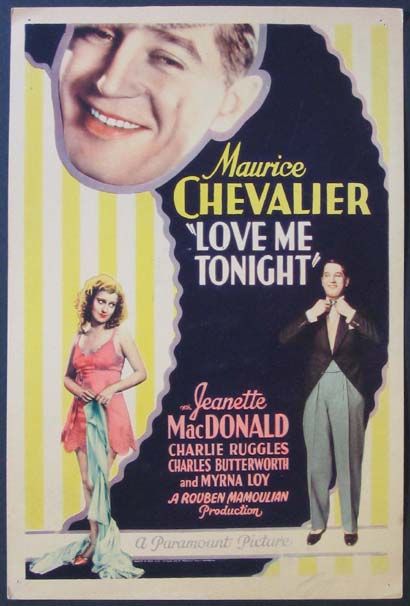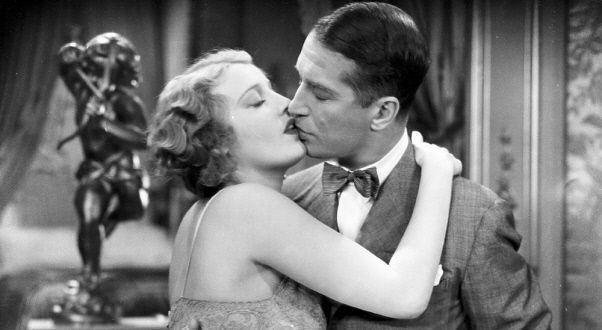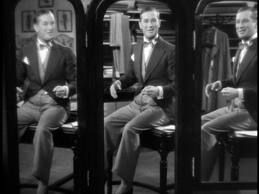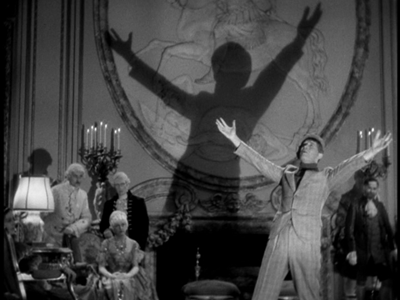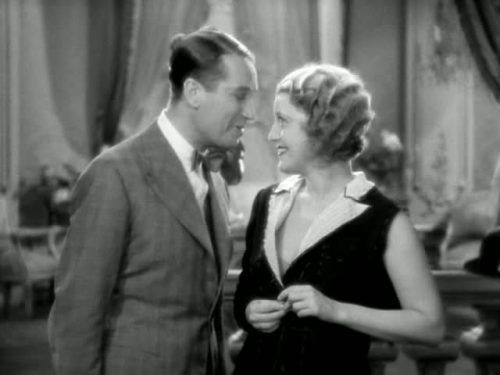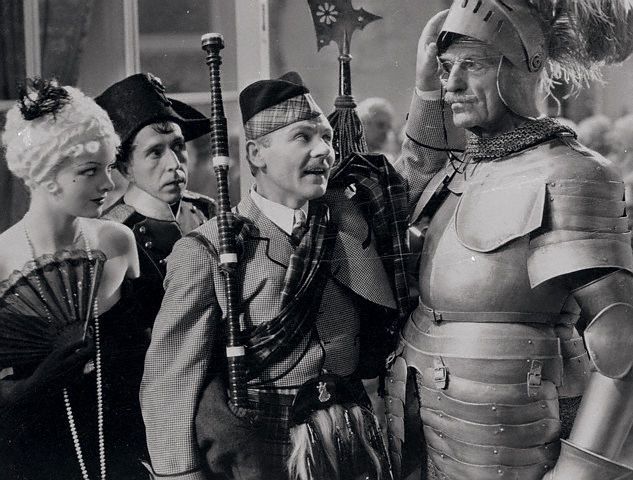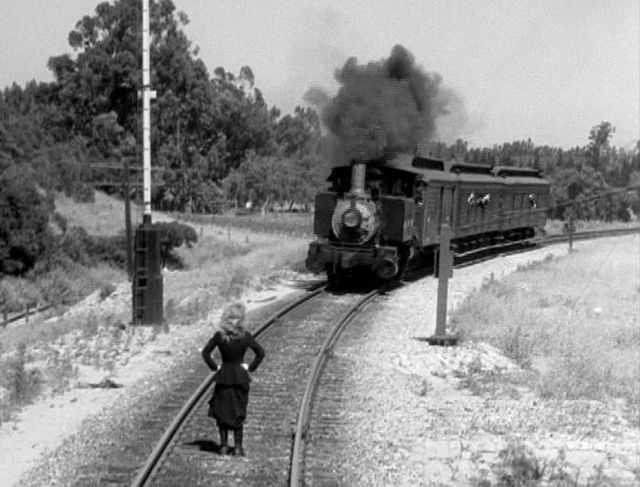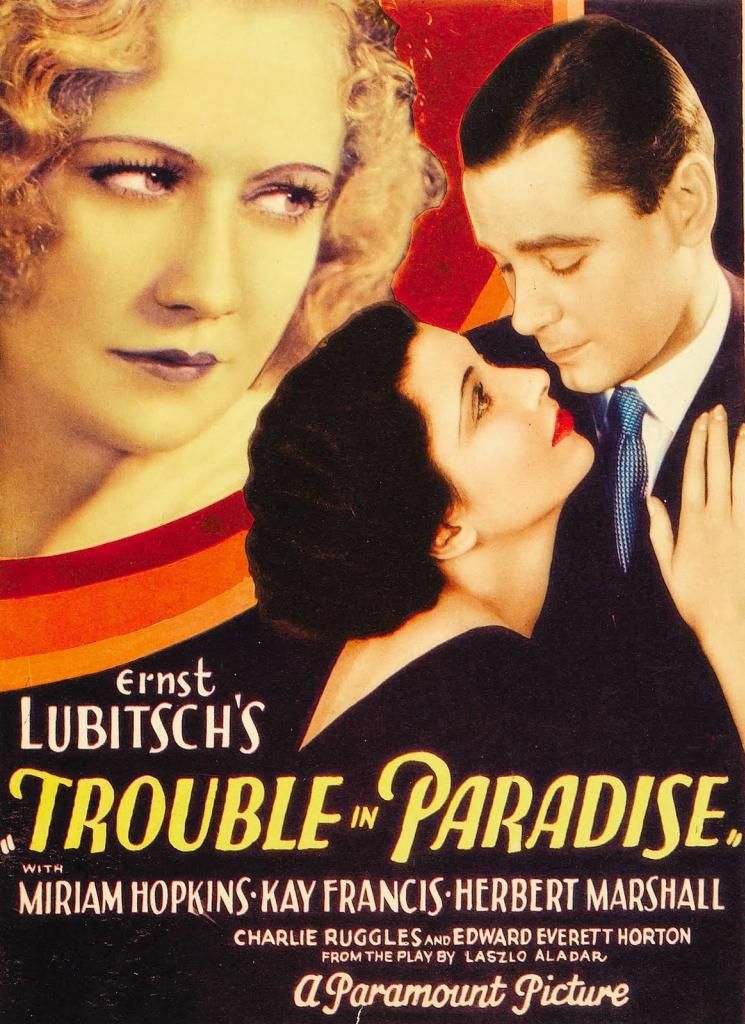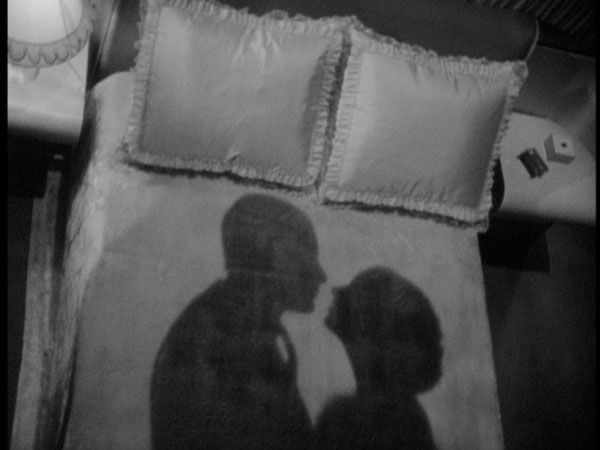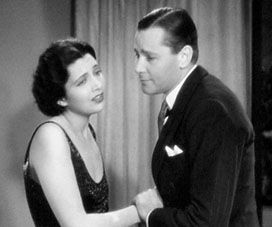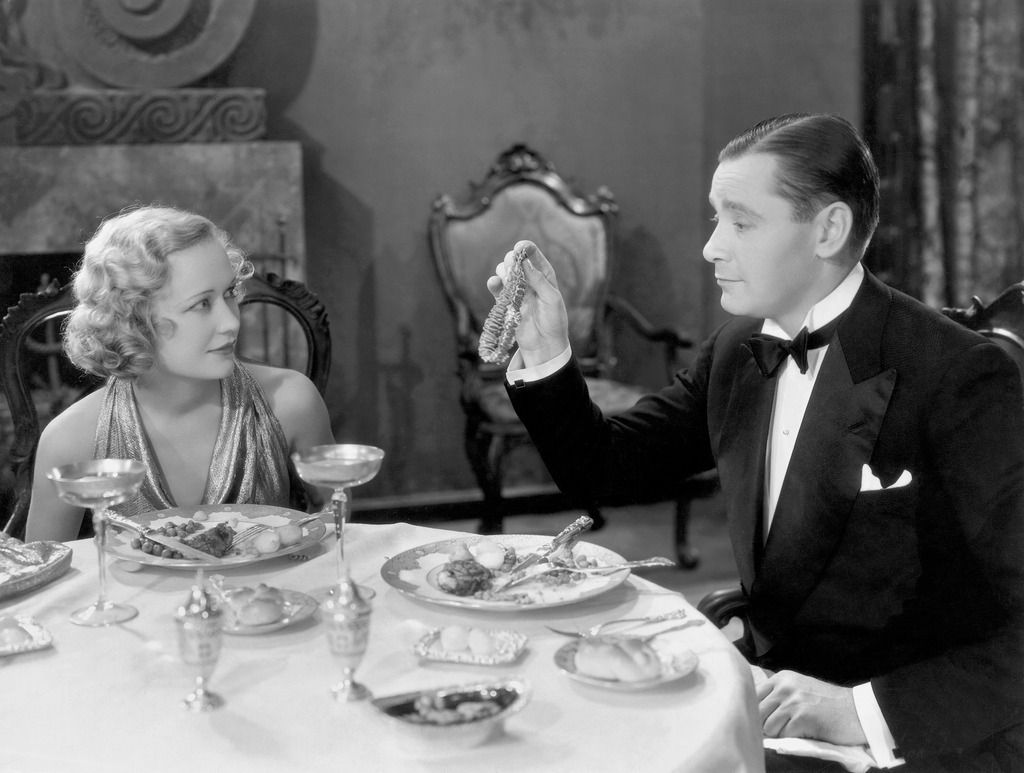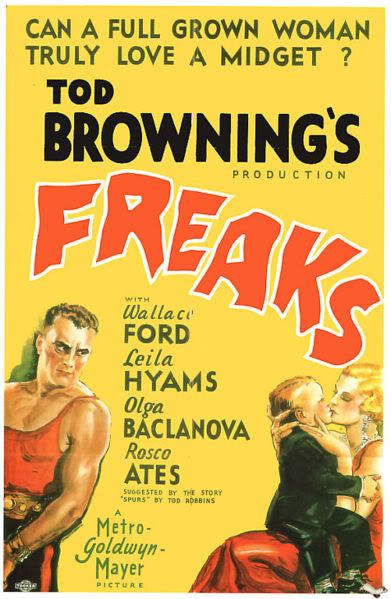Love
Me Tonight
1932
Director: Rouben Mamoulian
Starring: Maurice Chevalier, Jeanette
MacDonald, Charles Ruggles, Myrna Loy, C. Aubrey Smith
I
admit, I’ve been holding off on writing a review of this film for the simple
reason that I was saving it for a time when I really needed a pick me up. With the next school year just around the
corner, now seems as good a time as any for a cinematic happy pill, and by god,
Love
Me Tonight is most definitely a happy pill in film form. I love this movie, perhaps to an almost
irrational level, but I don’t care.
Love. I LOVE Love Me Tonight.
Maurice
(Chevalier) is a tailor living in Paris.
Princess Jeanette (MacDonald) is young widowed royalty living in the
confines of a palace along with an elderly duke (Smith), several aunts, a
boy-crazy young countess (Loy), and a womanizing viscount (Ruggles). It is the viscount that Maurice first meets
after the viscount stiffs Maurice on the bill for his latest suit. Determined to get his money back, Maurice
follows the viscount to the palace and poses as a baron, refusing to leave the
viscount’s side until he gets his fee.
Problem is, he and the Princess Jeannette fall in love while he’s
waiting for his money; whatever will happen when she realizes he’s not
aristocracy?!?!?!?
I
don’t even know where to begin. It’s
overwhelming, really. Shit.
Alright,
I’ll start at the opening of the film.
For my money, the first twenty minutes of Love Me Tonight are sheer
perfection and beyond clever. 1932 was
still fairly early in sound technology, but Mamoulian is remarkably wise with
how he utilizes sound as a tool. There
are three songs in the first twenty minutes, almost making Love Me Tonight appear to
be an operetta rather than a musical (it’s not), and these three songs are so
smart. First up, we open with a sleeping
Paris. Slowly, the city begins to awake,
and it does so via sound. Various
vendors open their shops, families open their doors, and make all the normal,
regular sounds of the city. Thing is,
Mamoulian builds a syncopated percussive song from all these sounds. The bootmaker bangs his hammer in time with
the woman fluffing her sheets.
Ultimately, the sounds become too cacophonous, and that’s when we meet
our hero. Maurice then walks down the
street, saying hello to everyone and everything in the second song, and it’s a
beautiful little scene that uses the song to further illustrate Parisian
life.
The
third song in the opening twenty minutes is probably the best scene from the
entire film, and one that’s been written about extensively. Yes, I’m going to write about it too. Maurice sings the famous “Isn’t It Romantic,”
the first time that song appeared in film.
Maurice sings it in his shop, and the tune gets passed from Maurice to
his customer to a taxi driver, etc. As
the song gets passed from person to person, it also travels from Maurice’s shop
to, eventually, Jeanette’s palace, where she hears it and then sings a
verse. I love love love this scene. It’s a remarkable way of connecting the hero
and heroine before they’ve even met, making it clear to us, the audience, that
these two are meant for one another even though they’ve never met. It’s a brilliant use of song, utterly clever,
showing how the song evolves and travels from person to person and situation to
situation, changing in each interpretation.
It’s a military march when the soldiers sing it, a happy tune when
Maurice introduces it, and full of slightly melancholic longing when Jeanette
sings it. It’s rightly remembered as the
most famous scene of the film; it’s brilliant.
The
songs, in fact, are one of the biggest draws of this film for me. I make it clear that I am a fan of musicals,
but I’ve also written several times about how I greatly prefer musicals where
the songs are woven within the plot and story rather than “backstage musicals”
where the focus is on “putting on a show.”
Love Me Tonight is one of THE best, if not THE best early
in-plot musicals. Nearly the entire plot
is somehow syncopated – butlers enter rooms walking to the beat of the
soundtrack music, Maurice runs upstairs in time with the tune, characters even
talk in rhyme half the time – and yet it works.
The story is an utter fantasy, as are most romantic comedies, so why not
indulge all the way? Let’s be honest,
I’m not looking for reality when I watch Love Me Tonight, so I embrace its
flights of fancy, including how it handles the in-plot songs.
Chevalier
is utterly sparkling as he essentially plays himself. Although much younger here than the Chevalier
that most Americans think of (re: the dirty old man who sings “Thank Heaven for
Little Girls” from Gigi in 1958), he was still in his early forties when Love
Me Tonight was made, hardly a young flower. Still, there’s something about seeing a
younger, more energetic, broad-chested Chevalier that, I admit, I find very
appealing. He works as my romantic hero
here. And when he sings “Mimi,” I
melt. I love pre-Code films, and Love
Me Tonight is pre-Code. The
sexual innuendo woven into nearly every other line of dialogue is sparkling,
and Chevalier was born for these lines.
“Mimi,” a song Maurice sings to Jeanette the first time they meet as he
tries to woo her, is nothing more than him saying, “Hey, you’re cute, wanna
fuck?” Now this on its own tickles me
(dirty!), but it’s made even better because Chevalier sings it straight to
camera. It’s not done in a two-shot, but
with Chevalier making direct eye contact with the audience. I smile so broadly when he sings the final
verse, “You know I want to have a little son of a Mimi by and by,” but hardly
gets out the words because of all the winks and eyebrows and nods he’s throwing
in, making it PERFECTLY clear what he’s REALLY singing about. Yes, Maurice IS Chevalier, but for crying out
loud, it’s fun watching Chevalier here.
Additionally,
although I’m not a huge Jeanette MacDonald fan, I really think the chemistry
between Maurice and Princess Jeanette (and christ, I love that they named the main
characters after the actors, that’s too funny) works. It’s actually mostly because of
Chevalier. MacDonald is her typical
MacDonald swooning self, with one notable exception that I will mention later
on, but Chevalier is unexpectedly shy and timid in certain scenes. When he finally makes a serious move on
Princess Jeanette, kissing her for the first time at the masquerade ball, she
slaps him and he sadly shrugs, far too sadly for my heart to handle, and he moves
to go away. When she stops him and kisses
him back, I can see him utterly light up, thinking that he lost what he wanted
but now finds it’s back. And when he
brokenly, laughingly tells her that he loves her, you can read his utter
disbelief all over his face when she says his love is returned. He makes it so painfully clear that he is
aware of their discrepancy in ranks, although she is not, and he also knows
that this utter dream of his will not and cannot last. It has the heartbreaking poignancy of a man
desperately clutching to a wish that cannot be fulfilled.
Yes,
Chevalier isn’t exactly the finest actor to grace the planet, but his handling
of the few scenes that require real emotion in Love Me Tonight utterly
wins me over. I feel the chemistry, I
feel the love, I get that coiling in my stomach that tells me I am really,
truly rooting for this couple to get together.
And later on, when the charade is up (WAIT, A COMPLICATION IN A ROMANTIC
COMEDY? SURELY YOU JEST) and Maurice
finally tells Princess Jeanette he is “just” a tailor instead of a baron, Chevalier
makes my heart break. He looks towards
the camera and says, utterly crestfallen, “Does that make so much difference?”
as Jeanette backs away in horror. This
sad, broken man, who knows that he just lost his love, is shockingly poignant. The movie is such an utter soufflé for its
vast majority, and throwing in this tiniest moment of loss and sadness somehow
grounds the rest of the film for me. It
makes their love and his loss feel real in a film filled with fantasy. The first time I watched Love Me Tonight, I was
loving it from the get go, but when it got to this particular scene, that’s
when I really fell, and I fell hard. I
love the silliness and the giddiness of the musical scenes and all the snappy,
sassy quips, but Chevalier’s simple performance when he outs himself to the
Princess just pushes it over the edge for me.
And
none of this has anything to do with the supporting cast. Love Me Tonight is easily in the
running for one of the best assemblies of a supporting cast ever. C. Aubrey Smith as the duke is hysterical as
he constantly gets his guests to play bridge and even sings a bit. Charles Ruggles, billed as Charlie Ruggles,
nearly steals every scene he’s in as the broke viscount, constantly trying to
hit on every woman he meets. And Myrna
Loy. I mean, I already adore Myrna Loy
with the passion of a thousand flames, and seeing her vamp it up here with some
of the juiciest lines in the film is joyous.
The snappy dialogue everyone gets to toss around is ridiculously fun,
such as when the viscount asks Myna Loy if she could go for a doctor, to which
she replies, “Why yes, send him right in!” as she adjusts her dress. As I’ve stated above, I really rather love
the two main characters, but Love Me Tonight is not just about
Maurice and Jeanette. Everyone else who
peoples this odd little fantasy universe is hysterical, snappy, and sassy. It’s a brilliant cast.
I’ve
mentioned in at least one other review a particular quirk of mine. We all have them, little things that we particularly
love or hate, thematic elements that make us either predisposed to loving or
hating a film. They don’t always have to
make a lot of sense or even be major plot elements, but if a film has one, it
can elicit a strong reaction. A rather
big quirk of mine in romantic comedies is one relating to gender. I am strongly predisposed to loving a rom com
if, in the finale, it is the woman who chases after the man. It’s about choice; typically, when a guy has
to go after a girl, as is the case in 98% of all rom coms, I sometimes read it
as the woman having no other options, so she guesses she’ll take this guy back
even though he was kind of a dick. This
implies she doesn’t have any other options; she’d better take this one because
who knows if anyone else will ever come along?
Or, on the other hand, why is it the guy who always has to
apologize? Why is it always the guy
who’s mucking up and has to humble himself to get the girl? Are all men such dolts? No, they’re not; women mess up too, y’know,
and women admit they made mistakes too.
Do I dislike all rom coms that follow this very traditional path? No, of course not, but every now and then
when I come across one that switches the “Prince Charming Saving The Princess”
stereotype in the finale, I am almost automatically a fan. It puts the woman in a position of power, of
choosing to fight for her relationship, of having the choice about being in the
relationship because she wants to be and not simply because it’s
convenient. The fact that Love
Me Tonight has Jeanette fighting for her man, choosing to be with
Maurice after he’s left, AND that this is 1932, is fantastic. It gives Jeanette an incredible amount of
power; she shifts from being a wilting flower to a wild animal in the finale of
the film. And I fucking love that. She realizes she has fallen in love, and also
that she has mishandled the situation pretty badly and chased Maurice away. So she grits her teeth and fights for
Maurice, stopping a frickin’ train in its tracks in order to get her beloved
back. Fuck yeah, Jeanette! You go, girl!
Um,
so in case the previous 2100 words (!!) haven’t yet convinced you, I really
really love this movie. It’s so happy,
the musical numbers are immensely clever and naughty, it has just the right
dose of pleasantly poignant emotions, it’s witty beyond all measure, AND it
even manages a bit of grrl power just to add the frosting to the cake! I’ve seen it more times than I can count and
I don’t tire of it. An absolute
favorite, no doubt.
Arbitrary
Rating: 10/10. Top 25 films of all time,
easy. Might even make an argument for
Top 10. LOVE.
